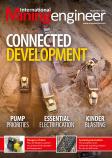Manfred Rösch introduces an innovative product designed to tackle corrosion
For many years standard concrete has been used as a substrate in areas with high levels of acid contamination, requiring expensive surface protection systems to protect the underlying structure. Penetration of the concrete layer resulted in damage and leaching, leading to possible environmental hazards when the acids enter the soils. This poses a great threat to the structural integrity of operating plants.
The effects of acid on concrete
The effects of acid exposure on concrete are significant, leading to the formation of a large amount of gypsum near the surfaces. This can result in disintegration, mechanical stress, and eventually the spalling of the concrete, revealing the fresh interior surface.
The effects of sulphuric acid on concrete as example can be described in the following chemical description:
Ca(OH)2 + H2SO4 ==> CaSO4.2H2O
3CaO.2SiO2.3H2O + H2SO4 ==> CaSO4.2H2O + Si(OH)4
Over the past few years, corrosion engineering design methods have shown that there is a greater need for acid-proof concrete. In the current economic climate, it’s important for businesses to run at optimal levels and avoid unnecessary downtime that could affect their bottom lines.
Traditional corrosion protection systems for concrete mainly use acid coating systems, membrane systems, and acid brick lining systems. These provide different layers of protection for the substrate. However, they are often time-consuming to apply and expensive to maintain.
With these factors in mind, DCE Corrosion Engineering has developed an innovative product that can offer the same properties as traditional systems but with faster turnaround times.
The solution - DCE CAST S99 NCC GEO
DCE CAST S99 NCC GEO is a silica-based acid resistant product manufactured and developed by DCE Corrosion Engineering using local aggregates and additives. It is used for all applications where low absorption and high acid resistance is required. Areas of use include, but are not limited to: electric wiring; counter current decantation (CCD) areas; effluent sumps; industrial flooring and bunded areas; solvent extraction (SX) areas; and acid storage areas.
Industries that could benefit from DCE CAST S99 NCC GEO include mining, construction, food and beverage, petrochemical, and refineries.
The user can enjoy several added benefits when deploying this product. Advantages include faster installation times, reduced labour costs, less downtime on operations, enhanced durability, increased sustainability, prolonged lifecycles, and cost-effectiveness.
Technical aspects of corrosion solution
DCE CAST S99 NCC GEO has excellent resistance against a wide range of industrial acids except hydrofluoric acid. It carries low wearing properties and high thermal resistance to sudden temperature changes. It is a pre-mixed product and only requires water to be added before application.
The application allows for it to be poured or pumped as per the user’s requirements. The product has a 12-hour setting time, which makes it very desirable for when a quick turnaround is required.
DCE CAST S99 NCC GEO has been put through rigorous testing and has proven its technical capabilities in both, lab as well as in the field applications. According to its developer, the results obtained have set new standards in the acid-resistant lining industry.
DCE Corrosion Engineering, is part of the Refraline group of companies – key players in refractory and corrosion engineering. The group’s vision is to save their customers money and energy with a strong emphasis on innovation. The development of DCE CAST S99 NCC GEO places the group in the forefront of not only new technology but also helping companies to meet their legal and ethical sustainability targets and commitments.
Manfred Rösch is CEO of Refraline





















